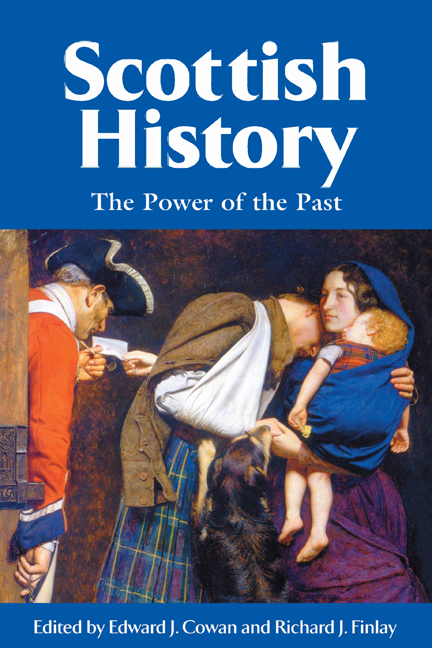Book contents
- Frontmatter
- Contents
- Contributors
- Introduction
- 1 The Picts‘ Place in the Kingship's Past Before John of Fordun
- 2 The Demonisation of King John
- 3 Late Medieval Scotland and the Matter of Britain
- 4 In Search of the Scottish Reformation
- 5 Civil Society and the Celts: Hector Boece, George Buchanan and the Ancient Scottish Past
- 6 The Covenanting Tradition in Scottish History
- 7 ‘What's in a Name?’: Pedigree and Propaganda in Seventeenth-Century Scotland
- 8 The Ideological Uses of the Picts, 1707-c.1990
- 9 The Jacobite Cult
- 10 Queen Victoria and the Cult of Scottish Monarchy
- 11 ‘Their Laurels Wither'd, and their Name Forgot’: Women and the Scottish Radical Tradition
- 12 Tomorrow's Ancestors: Nationalism, Identity and History
- Index
8 - The Ideological Uses of the Picts, 1707-c.1990
Published online by Cambridge University Press: 24 September 2020
- Frontmatter
- Contents
- Contributors
- Introduction
- 1 The Picts‘ Place in the Kingship's Past Before John of Fordun
- 2 The Demonisation of King John
- 3 Late Medieval Scotland and the Matter of Britain
- 4 In Search of the Scottish Reformation
- 5 Civil Society and the Celts: Hector Boece, George Buchanan and the Ancient Scottish Past
- 6 The Covenanting Tradition in Scottish History
- 7 ‘What's in a Name?’: Pedigree and Propaganda in Seventeenth-Century Scotland
- 8 The Ideological Uses of the Picts, 1707-c.1990
- 9 The Jacobite Cult
- 10 Queen Victoria and the Cult of Scottish Monarchy
- 11 ‘Their Laurels Wither'd, and their Name Forgot’: Women and the Scottish Radical Tradition
- 12 Tomorrow's Ancestors: Nationalism, Identity and History
- Index
Summary
‘It is nationalism which engenders nations, and not the other way round. Admittedly, nationalism uses the pre-existing, historically inherited proliferation of cultures or cultural wealth, though it uses them very selectively, and it most often transforms them radically. Dead languages can be revived, traditions invented, quite fictitious pristine purities restored.’ The late Ernest Gellner's pronouncement on the ficticity of national identities stands at the modernist extreme of an exciting and highly relevant debate about the provenance of nationalism. On the one hand, primordialists point to the historic continuity of ethnic and national groups from medieval, and, sometimes, ancient times: on the other, modernists point to the ways in which during the nineteenth and twentieth centuries the subethnic and highly localist peasantries of eastern Europe and Caucasia were transformed into ethnic nations, not least through the offices of nationalist intellectuals who endowed them with invented national pasts and distinctive written languages.
Despite their scepticism of primordialist claims, modernists recognise the need for compelling stories of ethnogenesis. In answer to the question ‘Do nations have navels?’, Gellner conceded that ‘some nations possessed ancient navels’, but argued that more ‘have navels invented for them by their own nationalist propaganda, and some are altogether navel-less’. By Gellner's lights, Scotland is an anatomical freak, a nation with two navels: one an authentic historic navel representative of a deep continuity from the Middle Ages of a lively Scottish national consciousness, the second involving modern retailoring of some scanty rags bequeathed from the ancient past. Traditionally, the Scots - a historic nation whose consciousness can be clearly documented from at least the turn of the fourteenth century - have traced their ethnogenesis back to the ancient west Highland settlement of Dalriada by Gaelic Scots from Ireland, and beyond. However, the shadowy Picts of Scotland's distant past have offered an alternative navel - ancient, yet also largely fabricated - for disaffected intellectuals. From the early eighteenth century through to the late twentieth century a variety of groups in quest of aboriginal historical legitimation, not only Scottish nationalists, but also Jacobites, celtophobic champions of Lowland Scots, a noted Marx-ist-Diffusionist, and, most recently, Ulster loyalists, have appropriated and reshaped an elusive Pictish antiquity to serve contemporary ideological needs.
- Type
- Chapter
- Information
- Scottish HistoryThe Power of the Past, pp. 169 - 190Publisher: Edinburgh University PressPrint publication year: 2020

